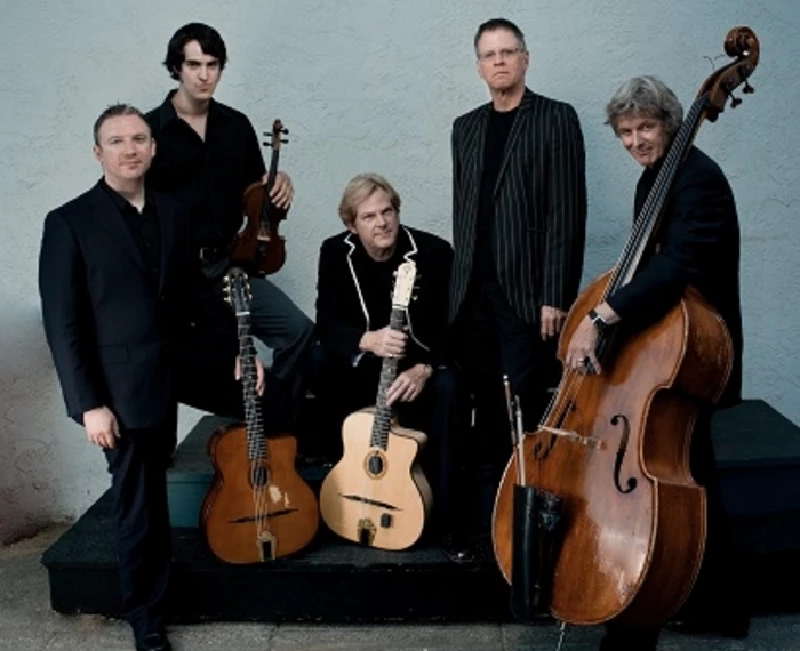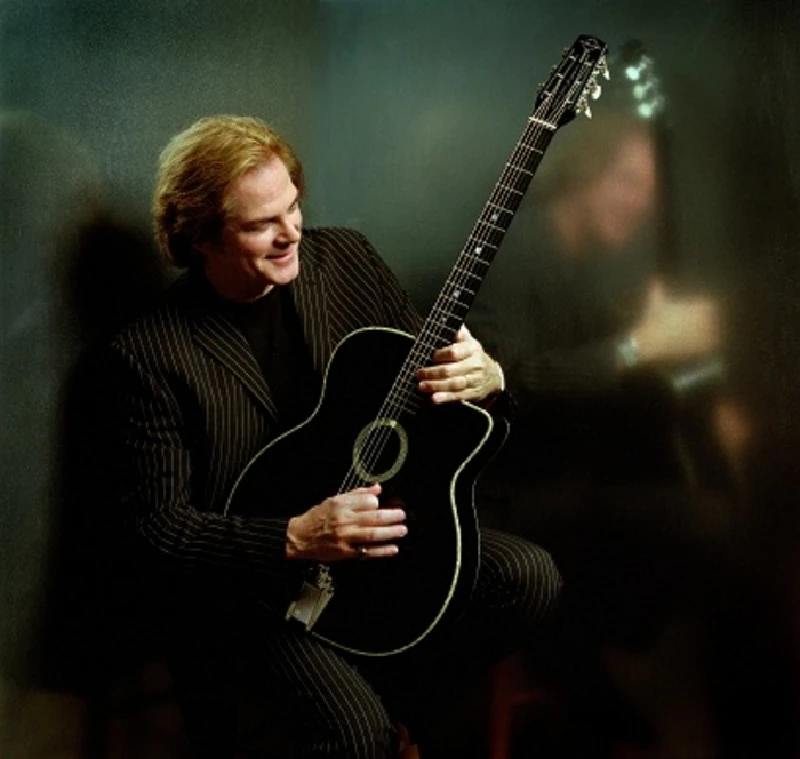John Jorgenson - Interview
by Lisa Torem
published: 24 / 1 / 2013

intro
Jazz guitarist and multi-instrumentalist and former Elton John band member John Jorgenson talks to Lisa Torem about the influence on him of Django Reinhardt and gypsy swing
John Jorgenson’s latest CD. 'One Stolen Night'., is a perfect example of his stunning technique and global reverence. Since early childhood, his parents encouraged his musical interests and exposed him to the classics. Though guitar won over his other pursuits, he also played the clarinet, bassoon, bass and Dobro. After meeting Chris Hill he joined the Desert Rose Band, which garnered him the Academy of Country Music’s “Guitarist of the Year” award multiple times. With the Hellecasters, formed in 1993, he won awards from 'Guitar Player Magazine'. A short gig with Elton John turned into a multi-year touring assignment due to his saxophone and guitar abilities. Though Jorgensen is adept at many styles and appreciates many forms of music, he eventually fell in love with Django Reinhardt’s gypsy swing. His dedication to the genre was not lost on film directors, club owners and recording labels. Jorgenson discusses how Reinhardt reigned him in so completely as well as the highlights of his recent recording. PB: John, you play a variety of instruments including Dobro, pedal steel, bass, clarinet and bassoon. What was it about the guitar that drew you in? JJ: I always loved the sound of stringed instruments, especially the guitar and harpsichord when I was quite young. As I learned more about how versatile and personal the guitar could be I loved it even more, and enjoyed exploring all the possibilities it has for expression. PB: In your twenties you played with the Rhythm Brothers. Is this when you became captivated by Django Reinhardt gypsy jazz style? JJ: Yes, in 1979 I first heard Django's music, and actually created the Rhythm Brothers entity at Disneyland so I could play that style of music in my "day job" then. PB: In 1994, you began a long-term stint with Elton John, whose style is more rock-oriented. How did you merge your styles and what were your responsibilities in the band? JJ: When first learning guitar, I played a lot of rock music, and had certainly heard most of Elton's songs on the radio, so it wasn't a stretch for me. Elton also wanted me to do a lot of harmony vocals, which I was well experienced in from singing in choirs growing up and, of course, the harmony-heavy Desert Rose Band, who I was playing with when Elton first saw me perform in 1988. Besides guitar and vocals I also played many "colour" instruments like mandolin, pedal steel guitar, clarinet, and saxophone. PB: You portrayed Django Reinhardt in the film, 'Head in the Clouds'. How did it feel to emulate Django in this way? JJ: That was one of the most fun experiences I have ever had, to get the chance to dress up like Django and be part of a huge film set, with dancers, actors, lighting designers, and a fantastic director in John Duigan. I would love to do more of this sort of thing. PB: Beyond gypsy jazz, you have explored bluegrass, country, heavy metal and the blues. Have you enjoyed performing in these styles equally? JJ: I do really love most styles of music; they each have certain elements that are attractive to me. I also like to discover new and different styles, although that doesn't happen as often as I've been playing, listening and discovering for so many years now!! PB: Let's talk about your album, 'One Stolen Night'. On it, you perform "Norwegian Dance," which was originally composed by Edvard Grieg and was intended to be played by four pianists. How did you translate this into an ensemble piece? JJ: Originally Django Reinhardt adapted this melody as a jazz ballad in the 1940s, and we started to perform it live a number of years ago. As we played it more and more, it developed into a very lovely arrangement and, although it does have improvisational sections, the overall piece is an actual arrangement. PB: On 'Slide Sister Slide,' the trombone (Tania and Sandra Diggerding) really adds a delightful drone effect. Was this coloration true to the gypsy jazz genre or an original idea? JJ: Over the years, there have been many additions and experimentations with the classic gypsy jazz instrumentation of three guitars, violin and string bass, so it's not "revolutionary" at all, but I often like to add in different instruments to make the music more colourful and interesting for the listener. My upcoming CD has more bouzouki, along with mandocello, piano, percussion and other instruments to broaden the palette even more. PB: Django Reinhardt was known for his work with French violinist Stephane Grappelli. Did you and violinist Jason Anick use any of their recordings as an influence? JJ: We are both certainly influenced by the recordings of Django and Stephane, and inspired by the chemistry and communication they obviously had. Jason and I have a very easy and spontaneous stage communication, and enjoy lots of "musical dialogue" as we play. PB: 'One Stolen Night' has a lovely tragic undertone. Was there a story or anecdote that inspired the title song? JJ: I had written the song and didn't have a title for it yet, but was already performing it and would sometimes ask the audience for suggestions. Most of the time the suggestions are not very good or appropriate, but the husband of one of our friends who supplies us with guitar strings gave me this suggestion, which I thought was absolutely perfect and fit the piece so well. The tragic part of that story is that he recently passed away after taking a bad fall in his basement. PB: 'Hungaria' is the sole tune on the album penned by Reinhardt, yet you play many of his songs live. Why did you choose this one for recording purposes? JJ: I chose this song to record because I thought that our arrangement really had a lot of energy and excitement live, and it gave us a good chance to show some soloing chops! PB: Was 'Kentucky Kastrinus' actually influenced by the music of that region? JJ: It wasn't really influenced by Kentucky, more so by Eastern European folk music, but the title refers to how similar rural folk music can be across all cultures, and each culture usually has a fast dance like this, i.e., a "hora" or "hoedown". PB: This year's performance schedule includes gigs at Django Festivals. What goes on at such events and what do you like most about performing there? JJ: Yes, we will be at Django Festivals in Maine, Las Vegas, and Whidbey Island, WA. It is fantastic for me to see so many enthusiasts in one spot, when years ago, when I first discovered the music myself, I felt very isolated. It's also a chance for us to see fellow musicians and share "road stories" best understood by other touring bands! In addition to the scheduled performances, there are always some amazing backstage jam sessions, and workshops/master classes for those who want to learn and better their own playing. PB: Imagine running into Django and Stephane at a nightclub. What three words would you say to them? JJ: "Thanks For Inspiring" "Simply Amazing Musicians" "Love Your Music" I might have to get others to go up and speak for me, too, as I very well could be speechless! PB: Thank you.
Picture Gallery:-

most viewed articles
current edition
Screamin' Cheetah Wheelies - Sala Apolo, Barcelona, 29/11/2023 and La Paqui, Madrid, 30/11/2023Anthony Phillips - Interview
Difford and Tilbrook - Difford and Tilbrook
Rain Parade - Interview
Oldfield Youth Club - Interview
Autumn 1904 - Interview
Shaw's Trailer Park - Interview
Cafe No. 9, Sheffield and Grass Roots Venues - Comment
Pete Berwick - ‘Too Wild to Tame’: The story of the Boyzz:
Chris Hludzik - Vinyl Stories
previous editions
Microdisney - The Clock Comes Down the StairsHeavenly - P.U.N.K. Girl EP
World Party - Interview
Michael Lindsay Hogg - Interview
Ain't That Always The Way - Alan Horne After The Sound of Young Scotland 2
Joy Division - The Image That Made Me Weep
Dwina Gibb - Interview
World Party - Interview with Karl Wallinger
Barrie Barlow - Interview
Prisoners - Interview
most viewed reviews
current edition
Marika Hackman - Big SighSerious Sam Barrett - A Drop of the Morning Dew
Rod Stewart and Jools Holland - Swing Fever
Ian M Bailey - We Live in Strange Times
Loves - True Love: The Most of The Loves
Paul McCartney and Wings - Band on the Run
Autumn 1904 - Tales of Innocence
Roberta Flack - Lost Takes
Banter - Heroes
Posey Hill - No Clear Place to Fall
Pennyblackmusic Regular Contributors
Adrian Janes
Amanda J. Window
Andrew Twambley
Anthony Dhanendran
Benjamin Howarth
Cila Warncke
Daniel Cressey
Darren Aston
Dastardly
Dave Goodwin
Denzil Watson
Dominic B. Simpson
Eoghan Lyng
Fiona Hutchings
Harry Sherriff
Helen Tipping
Jamie Rowland
John Clarkson
Julie Cruickshank
Kimberly Bright
Lisa Torem
Maarten Schiethart